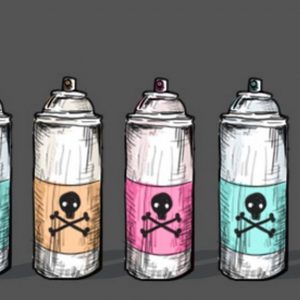What is Sudden Sniffing Death Syndrome?
Sudden sniffing death syndrome refers to the rapid and irregular heartbeat triggered by inhalant vapors that alter the mind when breathed in. Children can die the first time, or any time, they try an inhalant. This is called sudden sniffing death syndrome, which is usually associated with cardiac arrest.
The inhalant causes the heart to beat rapidly and erratically, resulting in a heart attack. While Sudden Sniffing Death Syndrome can occur with many types of inhalants, it is particularly associated with the abuse of air conditioning coolant, butane, propane, and the chemicals in some aerosol products.
How Common Is Sudden Sniffing Death Syndrome?
New data released today by the Substance Abuse and Mental Health Services Administration (SAMHSA) indicates that 12-year-old kids are more likely to get high from common, legal household substances including aerosol computer cleaners, air fresheners, hair spray or shoe polish than use cigarettes or marijuana.
One in five students in the United States has used an inhalant to get high by the time he or she reaches eighth grade, according to the NIPC.
Sniffing is particularly popular in younger teens because it is so readily available. Markers, whip cream cans, glues, spray paint, air fresheners, and butane cooking spray are just a few of the more than a thousand products that can be used to get high by sniffing.
Unfortunately, younger teens are also the most affected by using these toxic substances, said Dessa Bergen-Cico, assistant professor in the Department of Health and Wellness at Syracuse University.
Why Does Sudden Sniffing Death Syndrome Happen So Quickly?
Inhaled chemicals are rapidly absorbed through the lungs into the bloodstream and quickly distributed to the brain and other organs. Within minutes, the user experiences intoxication, similar to the effect of drinking alcohol. With inhalants, however, intoxication lasts only a few minutes, so some users prolong the “high” by repeatedly inhaling.
No one can predict how much of an inhalant will kill. A young person can use a certain amount one time and seem fine, but his or her next use could be fatal.
The Texas Commission on Drugs and Alcohol Abuse reports the following ways that inhalants can kill.
- Asphyxia – Solvent gases can cause a person to stop breathing from a lack of oxygen.
- Choking – Users can choke on their own vomit.
- Suffocation – This is more common among users who inhale from plastic bags.
- Injuries – Inhalants can cause people to become careless or aggressive. This often leads to behaviors that can injure or kill, such as operating a motor vehicle dangerously or jumping from great heights. Teens can also get burned or even be killed if someone lights a cigarette while they are ‘huffing’ butane, gasoline, or some other flammable substance.
- Suicides – Coming down from an inhalant high causes some people to feel depressed, which may lead them to take their own lives.
- Cardiac arrest –Chemicals from inhalants can make the heartbeat very fast and irregularly, then suddenly stop beating. This is called cardiac arrest. One reason why this may happen is that inhalants somehow make the heart extra sensitive to adrenaline (Adrenaline is a hormone that the body produces, usually in response to fear, excitement, or surprise). A sudden rush of adrenaline combined with inhalants can make the heart stop instantly. This ‘sudden sniffing death’ is responsible for more than half of all deaths due to inhalant abuse.
Another very real danger of inhalants is that they often lead young people to try other drugs whose effects are even more intense and last longer.
Sudden Sniffing Death Syndrome Prevention
Knowing the dangers and effects of inhalant abuse can save your child’s life. Read the personal stories from families who have experienced loss of a loved one, and hopefully learn from these stories so you can avoid what these people have gone through.
Short-term effects of inhaling include:
- Headaches
- Muscle weakness
- Abdominal pain
- Severe mood swings
- Violent behavior
- Belligerence
- Slurred speech
- Numbness
- Tingling of hands and feet
- Nausea
- Hearing loss
- Depressed reflexes
- Stupor
- Loss of consciousness
- Limb spasms
- Fatigue
- Lack of coordination
- Apathy
- Impaired judgment
- Dizziness
- Lethargy
- Visual disturbances
The inhalant user will initially feel slightly stimulated and, after successive attempts, will feel less inhibited and less in control. Hallucinations may occur and the user can lose consciousness. Worse, he or she, may even die.
Long-term effects of inhaling include:
- weight loss
- muscle weakness
- disorientation
- inattentiveness
- lack of coordination
- irritability
- depression
Different inhalants produce different harmful effects, and regular abuse of these substances can result in serious harm to vital organs. Serious, but potentially reversible, effects include liver and kidney damage.
Harmful irreversible effects include:
- hearing loss
- limb spasms
- central nervous system (including brain) damage





